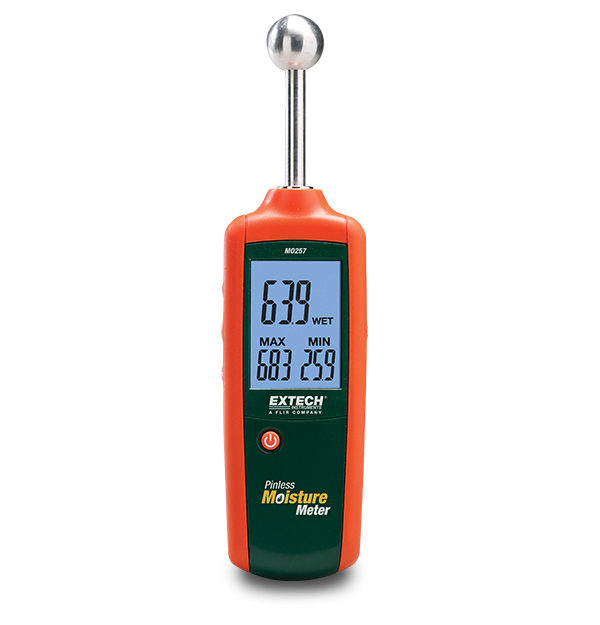The Ultimate Guide to Dampness Meters: A Comprehensive Introduction and Exactly How They Can Save You Cash
Moisture meters serve as essential tools in finding and keeping track of moisture material in products, aiding in stopping pricey damages and guaranteeing the top quality of items. Comprehending the nuances of different kinds of dampness meters, their applications, and the potential cost-saving benefits they use can be a game-changer for organizations and professionals alike.
Kinds of Dampness Meters
Numerous kinds of moisture meters are offered for various applications in numerous industries. One typical type is the pin-type dampness meter, which determines the electric resistance in between 2 pins inserted right into a material. This type is appropriate for timber, drywall, and various other structure products. Pinless wetness meters, on the other hand, usage electro-magnetic sensing unit plates to check a larger location without causing damage to the material's surface. Moisture Meter. These meters are suitable for promptly analyzing wetness degrees in big areas such as floorings and wall surfaces.

Additionally, there are additionally specialty dampness meters created for particular materials like hay, dirt, or grain. These meters offer exact moisture readings tailored to the distinct residential or commercial properties of the product being checked. Infrared moisture meters gauge the thermal residential properties of a material to establish its moisture web content non-invasively, making them helpful for applications where pin or pinless meters might not be ideal. Understanding the different sorts of moisture meters readily available can help sectors choose the most suitable device for their specific moisture dimension needs.

Benefits of Utilizing Moisture Meters
Moisture meters supply invaluable benefits in properly analyzing and keeping an eye on wetness levels in varied products and atmospheres. One of the primary benefits of making use of dampness meters is the prevention of possible damage created by excess wetness.
Moreover, using wetness meters can lead to raised energy performance. In agricultural settings, dampness meters play an essential duty in optimizing plant returns by allowing farmers to keep an eye on dirt wetness degrees and make educated irrigation decisions.
Just How to Pick the Right Dampness Meter
Selecting the ideal moisture meter entails taking into consideration key factors such as material compatibility, measurement range, and calibration accuracy. When selecting a dampness meter, it's important to make sure that the meter appropriates for the details product you will certainly be screening. Various materials have varying electrical residential or commercial properties that can impact wetness readings, so selecting a meter created for your material is important for accurate outcomes. Additionally, think about the dimension array of the dampness meter. Ensure that the meter can discover wetness degrees within the variety needed for your applications. Calibration precision is an additional essential factor to remember. Choose a wetness meter with trusted calibration to make certain regular and precise analyses. Some meters might need regular calibration modifications, so comprehending the calibration process is essential. By carefully evaluating these variables, you can select a moisture meter that meets your demands and gives precise moisture dimensions for your jobs.
Proper Methods for Wetness Meter Usage

Cost Savings Via Dampness Meter Applications
Just how can the critical utilization of dampness meters lead to considerable price savings across numerous industries? In the farming industry, dampness meters help in figuring out the optimum time for gathering crops, preventing over-drying or excess moisture that can impact the last item's high quality.
Similarly, in building and construction, wetness meters help protect against pricey damages by finding moisture degrees in building products, such as wood or concrete, which can lead to architectural problems if not addressed immediately. By identifying issue locations at an early stage, contractors can take restorative actions to stay clear of comprehensive repair services or substitutes, ultimately saving time and money.
Additionally, in the food processing market, moisture meters are essential for keeping an eye on item high quality and making sure conformity with safety laws. By accurately measuring wetness web content in foodstuff, manufacturers can avoid wasting, keep quality, and reduce waste, resulting in substantial price financial savings. Overall, the strategic application of moisture meters is an important investment that can lead to substantial cost reductions and improved efficiency across various markets.
Final Thought
Finally, dampness meters are beneficial tools for spotting and measuring moisture degrees in numerous products. By making use of the right dampness meter and adhering to correct methods, individuals can efficiently prevent expensive damages caused by excess dampness. Purchasing a high quality moisture meter can lead to substantial expense savings over time by recognizing possible concerns early and enabling timely remediation. Ultimately, wetness meters are important tools for preserving the honesty and long life of products and structures.
Wetness meters serve as indispensable devices in spotting and checking moisture content in products, aiding in stopping costly damages and making certain the quality of products. Infrared moisture meters determine the thermal homes of a product to determine its wetness web content non-invasively, making them useful for applications where pin or pinless meters may not be ideal.Dampness meters provide vital advantages in precisely examining and monitoring dampness levels in varied products and environments. In farming settings, wetness meters play a crucial additional info role in optimizing crop returns by allowing farmers to check soil moisture levels and make informed irrigation decisions.In final thought, wetness meters are important devices for identifying and gauging moisture levels in different products.